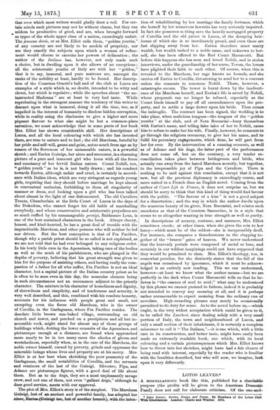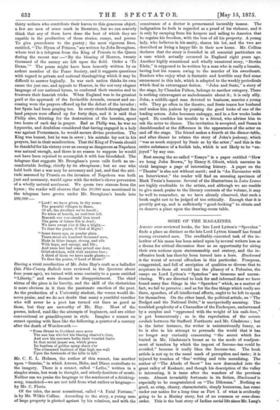LOTOS LEAVES:*
A MISCELLANEOUS book like this, published for a charitable purpose (the profits will be given to the American Dramatic Fund) does not call for elaborate criticism. Of the one-and- Logos Leaves; Stories, Staffs, and Poems. By Members of the Lotus Club With Illtu3trstious. Lundell: MOW sad Windup. len.
thirty writers who contribute their leaves to this generous object, a few are men of some mark in literature, but we can scarcely think that any of them have done the best of which they are capable in the production of these stories, essays, and poems. To give precedence to the poetry ; the most vigorous lines, entitled, "The Hymn of Princes," are written by John Brougham, whose text is a telegram from the King of Prussia to the Queen during the recent war :—"By the blessing of Heaven, twenty thousand of the enemy are left upon the field. Order a 'Te Denm." The poem might have been honestly written by an ardent member of the Peace Society, and it suggests questions with regard to private and national thanksgiving which it may be difficult to answer logically. In war each nation thinks its own cause the just one, and appeals to Heaven, in the not very elegant language of our national hymn, to confound their enemies and to frustrate their knavish tricks. When England was in its greatest peril at the approach of the Invincible Armada, earnest and un- ceasing were the prayers offered up for the defeat of the invader ; but Spain had been praying too. In every church throughout the land prayers were offered up for forty days, and it is said that Philip also, thirsting for the destruction of the heretics, spent two hours of each day in prayer. Bad as Philip was, he was no hypocrite, and doubtless considered that having engaged in a holy war against Protestants, he would securedivine protection. The Ring was honest, but he was in error ; his mistake lay not in his prayers, but in their misdirection. That the King of Prussia should be thankful for his victory over an enemy so dangerous as Napoleon was natural enough, and there is no reason to suppose he would not have been rejoiced to accomplish it with less bloodshed. The telegram that suggests Mr. Brougham's poem calls forth an un- comfortable feeling, chiefly by its abruptness ; but no one who held both that a war may be necessary and just, and that the atti- tude assumed by Prussia on the invasion of Napoleon was both just and necessary, would agree with the writer's clever perversion of a wholly natural sentiment. We quote two stanzas from the hymn ; the reader will observe that the 20,000 men mentioned in the telegram have grown under Mr. Brougham's hands into 200,000:—
"Lord ! we have given, in thy name, The peaceful villages to flame, Of all, the dwellers we've bereft ; No trace of hearth, no roof-tree loft. Beneath our war-steeds' iron tread The germ of future life is dead ; We have swept o'er it like a blight,— To thee the praise, 0 God of Right !
"Some hours ago, on yonder plain There stood six hundred thousand men, Made in thine image. strong, and rife With hope, and energy, and life ; And none but had some prized one clear, Grief-stricken, wild with anxious fear ; A third of them we have made ghosts.— To thee the praise, 0 Lord of Hosts !"
Having a vivid recollection of Mr. John Hay's craft as a balladist (his Pike-County Ballads were reviewed in the Spectator about four years ago), we turned with some curiosity to a poem entitled "Liberty," and were doomed to disappointment. The chief virtue of the piece is its brevity, and the skill of the rhetorician is more obvious in it than the passionate emotion of the poet. As the production of a University student, the verses would de- serve praise, and we do not doubt that many a youthful versifier who will never be a poet has turned out lines as good as these, but they are unworthy of Mr. Hay. Most of the poems, indeed, read like the attempts of beginners, and are either conventional or grandiloquent in style. Imagine a sonnet on sunset opening with lines like the following, a quarter of a century after the death of Wordsworth :—
" From Orient to Occident once more
The sun has whirled his blazing chariot's rims, And now his coursers bathe their wearied limbs In that aerial jasper sea, which pours Its baptism of golden spray sheer o'er The crimsoned bastions of that high sea-wall Upon the foreheads of the hills to fall."
Mr. C. E. L. Holmes, the author of this sonnet, has another upon "Sunrise," in which Aurora, Hebe, and Diana contribute to the imagery. There is a sonnet, called " Lethe," written in a simpler strain, but weak in thought, and utterly destitute of music. Neither can we praise the language or the sentiment of a drinking- song, translated—we are not told from what author or language— by Mr. C. Florio.
• Of the tales, the most sensational, called "A Fatal Fortune," is by Mr. Wilkie Collins. According to the story, a young man of large property is plotted against by his relatives, and with the connivance of a doctor is pronounced incurably insane. The indignation he feels is regarded as a proof of his violence, and it is only by escaping from his keepers and sailing to America that he regains his freedom, with the loss of all his property. A young lady, who believes in his sanity, shares his lot, and the two are described as living a happy-life in their new home. Mr. Collins declares that the story is founded in all essential particulars on a case which actually occurred in England eight years ago. Another highly sensational and wholly unnatural story, "Bertha Klein," is supposed to be written by a man who is really a lunatic, having lost his reason owing to the murder of his sweetheart. Readers who enjoy what is fantastic and horrible may find some amusement in this tale, which is adapted to the weekly periodicals which deal in extravagant fiction. "John and Susie," a story of the stage, by Chandos Fulton, belongs to another category. There is nothing extravagant or melodramatic about it ; it is only silly. John, a middle-aged man devoted to business, marries a young wife. They go often to the theatre, and Susie teazes her husband and makes him jealous by praising the good looks of one of the leading actors. John becomes unhappy, and in a few weeks looks aged. He confides his trouble to a friend, who advises him to ask the actor to dinner. The invitation is accepted, and Susan is dumbfounded at the difference in the appearance of the actor on and off the stage. The friend makes a fourth at the dinner-table, and after dinner he relates the story of John's jealousy, which "was as much enjoyed by Susie as by the actor ;" and this is the entire substance of a foolish tale, which is not likely to be "en- joyed" by any one.
Best among the so-called "Essays" is a paper entitled "How we hung John Brown," by Henry S. Olcott, which narrates in vivid language a page of interesting history. A paper on the "Theatre" is also not without merit; and in "An Encounter with an Interviewer," the reader will find an amusing specimen of Mark Twain's humour. Several of the illustrations in Lotos Leaves are highly creditable to the artists, and although we are unable to give much praise to the literary contents of the volume, it may be well to remember, as we have already observed, that such a book ought not to be judged of too critically. Enough that it is prettily got up, and is sufficiently "good-looking" to obtain and to deserve a place upon the drawing-room table.



































 Previous page
Previous page